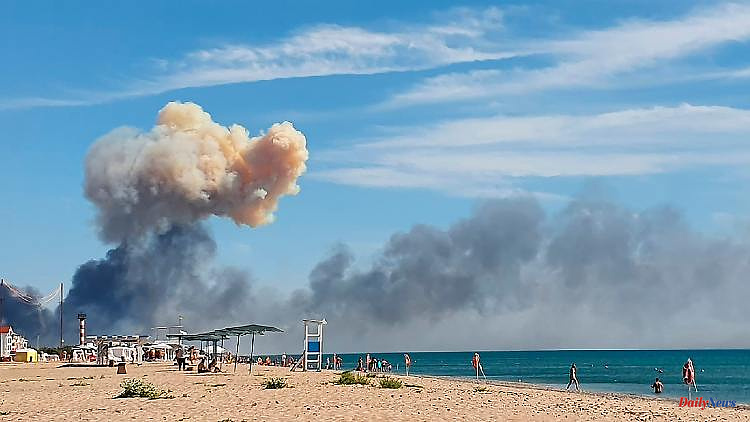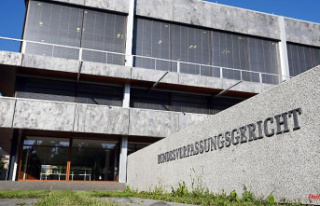Military expert Gustav Gressel assumes that Ukraine uses its own missiles for its attacks on Russian bases in Crimea. The arms deliveries are still too hesitant: "Despite all the confessions that Russia must not win this war, the support is just enough for Ukraine to stay in the fight - but it is not enough to fight back the Russians."
Gressel fears that Europe will fall for Putin again: Russia will use the ceasefire negotiations primarily to "regroup in order to strike again at a later date." He doesn't expect that to happen until late March, early April at the earliest, in the third rotation period of this war.
ntv.de: What do you think caused the explosions at Russian military bases in Crimea? Are these attacks by Ukraine or accidents, as Russia claimed after the first such incident?
Gustav Gressel: At least in the case of the explosions at the Saki air force base, I think the version of an accident is very, very implausible. Of course I don't know how it really was because I'm not there and I can't do any research. But it is clear that an air force base is structurally secured in such a way that a chain reaction from accidents is prevented in order to keep damage as low as possible in the event of an accident.
What do you think of the hypothesis that it was sabotage?
That too is very unlikely. Any saboteurs should have set off the explosions in broad daylight - since the detonations in Saki happened during the day. They would have had to infiltrate the base, install explosive devices in various separate facilities, and then retreat. There is nothing to indicate that this happened: there are no eyewitness reports of gunfire, there are no videos of helicopters going up to search for fugitive intruders, nor are there reports of roadblocks around the base. It's also a paranoid guarded base. In the vicinity of the air base, residents deemed unreliable were evicted from their homes. It is safe to assume that it would not be possible for anyone to penetrate this base without the Russians noticing.
What then triggered the explosions?
If we rule out an accident and sabotage as the cause, we are left with two options: a drone or a ballistic missile. Drones fly relatively slowly, you can usually see them from the ground. However, there are no corresponding recordings or eyewitness reports. And given the relatively large craters suggesting there were subterranean explosions, it would have to have been a larger drone. Ammunition that can penetrate underground bunkers must have been used in the attack in order to detonate the ammunition stored there. It is therefore most likely that it was a ballistic missile.
The Western multiple rocket launchers that were delivered to Ukraine only have a maximum range of 80 kilometers, they couldn't have been.
A Grom 2 rocket, i.e. "Donner 2", a model very similar to the Iskander, is therefore an option. This program has existed under different names in Ukraine since the early 2000s. Similar to the Neptun cruise missile, with which Ukraine sank the Russian flagship "Moskva", the Ukrainian army is likely to have only a few such missiles and only a handful of launchers for them. They've probably waited until a good opportunity arose to make effective use of what few missiles they have.
Why doesn't Moscow admit that there was a Ukrainian attack? Was there any Russian military response to this attack at all?
There is an increased presence of anti-aircraft missiles not only in Crimea, but also around and at air force bases located in Russia and Belarus and at the same time within the 500-kilometer radius the missile is believed to have. The Russians apparently assume that there are other Grom-2 missiles. And they don't acknowledge these attacks because they're embarrassed. S-300 and S-400 anti-aircraft missiles are stationed in Crimea, the crown jewels of Russian anti-aircraft defense, which Russia also places prominently in exports. It would be embarrassing to admit that Ukraine could fly such an attack without actually using those missiles.
The Ukrainian filmmaker Volodymyr Demchenko, who is currently fighting as a soldier in the Donbass, wrote on Twitter that the Ukrainian army has had successes, but ultimately the invaders have been advancing slowly but steadily since April. This does not apply to the south, but there is no major counter-offensive there either. In some places on the front, the Russian artillery is ten times superior. That sounds very pessimistic. Is Ukraine's struggle hopeless?
He's not hopeless, but Demchenko is right: Ukraine hasn't been able to break the Russian attacking momentum so far. They were able to slow down the pace of the attack, and by announcing a counteroffensive in the south, they forced the Russians to withdraw troops from Donbass. But the Russians are now standing on the outskirts of Bachmut. This is not good news for Ukraine.
What hasn't changed for months: Ukraine's ability to survive depends primarily on Western supplies. Unfortunately, it is still far too hesitant. Despite all the avowals that Russia must not win this war, the support is just enough to keep Ukraine in the fight - but not enough to push the Russians back. Ukraine lacks battle tanks, armored transport vehicles, artillery, and anti-aircraft defenses. This has been known for months and still nothing is happening, at least not enough. As long as material aid from the West remains at this level, Ukraine has at best the chance to wear down the Russians to such an extent that the front eventually comes to a standstill.
Demchenko expects the Russians to enter into ceasefire negotiations in late September or October. He believes that the Russians will continue to fight despite such talks. But Europe and the USA would still reduce the arms deliveries to a minimum if only "peace" finally seemed within reach. Do you think it's possible that the West is really falling for Putin again?
I think that's possible for Europe, yes. There are many voices, especially from those around Emmanuel Macron and Olaf Scholz, who are counting on negotiations. Apart from the Northern Europeans and the Eastern Europeans, London seems to me to be the only capital in Europe that has understood what this war is about. In Washington, things are a bit ambivalent at the moment. But I hope that the US will come to its senses.
Why should Russia have an interest in October ceasefire talks?
At the end of September, beginning of October, the autumn rotation takes place in the Russian army. A lot of soldiers' contracts expire, then bandages have to be removed and replaced with new ones. The last phase of the rotation was at the end of March, beginning of April - at that time the Russians withdrew from the Kyiv area. In such rotation periods, the Russian army is always weak, so it is conceivable that Russia will try to bridge this with ceasefire negotiations. On the other hand, the Russians have stepped up their recruitment efforts. I would therefore guess that they will try to hold out for the next rotation period and that they will only aim for negotiations in the next rotation, i.e. in spring 2023. In any case, one can assume that Russia will use such negotiations primarily to regroup in order to strike again at a later point in time.
Is it now actually clear how many western multiple rocket launchers are already in use in Ukraine?
There are at least sixteen HIMARS from the US and nine M270s from European countries, including three from Germany, the MARS II.
Ukrainian military experts say 50 multiple rocket launchers would make a difference. Do you think that's a realistic number?
Yes - if we scrape together the ammunition for it. The problem with the HIMARS is that Ukraine uses them as a sort of air force surrogate to deliver highly targeted strikes against point targets in Russian depths. She does not use the HIMARS to repel Russian attacks. The precision of the GPS-guided ammunition is not so well suited for this either, so comparatively stupid ammunition that can be used widely in the area makes more sense. If you walk over a relatively large area with cluster ammunition, for example, you don't have to track to the second where the enemy's tanks are driving. However, such ammunition has not been produced in the West since the end of the Cold War for fear of collateral damage. To date, Ukraine has used its own multiple rocket launchers for such operations. But they are slowly running out of ammunition, and the 220 and 300 millimeter artillery rocket ammunition for the Smerch and for the Uragan is not produced in the West.
Not even in the former Warsaw Pact states?
no The Soviet Union did not supply heavy rocket launchers to its satellite states, because they should always lag behind the Red Army in their military capabilities: if they defected, they should not have a military that stood a chance against the Soviet Union. - What applies to the HIMARS also applies to the Panzerhaubitze 2000.
In what way?
It has a very long range and shoots very precisely. But for normal artillery support at the front, Ukraine did not get enough equipment. It would be better to equip them with M109 tanks. They're not as good as the Panzerhaubitze 2000. But war is also about mass. British and Norwegians supplied M109 to Ukraine, other countries did not. There is a whole range of used M109s in the NATO countries - especially in the USA - that could be given to Ukraine. Germany also used the M109 in the past, but there are no longer any in Germany.
Do you see a chance that Ukraine will push back Russian troops in the south across the Dnipro?
Difficult. The Russians have brought reinforcements into the area, they have placed strong reserves on the east bank. The central problem for Ukraine is the Russian attack pressure in the Donbass. You cannot extract many forces there to mass more forces in the south.
Ukraine destroys bridges across the Dnipro to cut off Russian supplies. Couldn't that also cause difficulties when Ukraine wants to liberate the areas south-west of the river?
On the one hand yes, on the other hand Ukraine would attack upstream from the Zaporizhia area. Bottom line, I would say that cutting off the Russian forces on the west bank of the Dnipro from their reserves is to Ukraine's advantage. From a military point of view, these attacks make sense. However, it must be said that the timing of the offensive is more due to political considerations, namely the attempt to prevent the follow-up referendum in Kherson. From a military point of view, it would be better to wait for late September or early October, when the balance of power is likely to have shifted more in favor of Ukraine. Then not only is the Russian rotation period, but also many Ukrainian soldiers will come back from the training program in Great Britain. And maybe the West will have delivered a little more by then.
Hubertus Volmer spoke to Gustav Gressel












